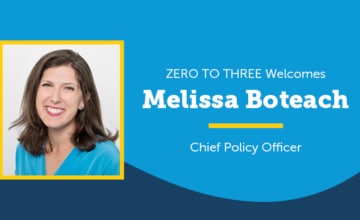ZERO TO THREE’s policy team tackles a wide range of issues. This blog post comes from a week when the team worked on preschool expulsion, STEM education for young children, paid family leave, and Children’s Mental Health Awareness Day.
Here in the land of baby policy, a grab bag of issues often comes our way at ZERO TO THREE in a short period of time. In one particular week, we tackled preschool expulsion, STEM education for young children, paid family leave, and Children’s Mental Health Awareness Day. The common thread in this seemingly disparate group is that they all relate in some way to early social-emotional development.
Once thought of in policy circles as “that mushy stuff,” early social-emotional development is now understood to be the bedrock on which rests the sense of self that helps us tackle the tasks of life. Together with growing cognitive abilities, it is the “bricks and mortar” of development.
The security we gain from early close relationships with a trusted adult or adults—usually our parents—helps us cope with the frustrations and accomplishments of school and life. Let’s look at how social and emotional development plays out as the common thread among four issues:
Preschool Expulsion
A recent study found increases in young children being kicked out of public preschool for behavior problems. If in fact social-emotional issues were the problem, they didn’t start overnight. Routine developmental screening in all domains would help catch problems in the youngest children before they balloon into something as dire as being expelled from a program that ostensibly specializes in working with small children. Preschool teachers need information and training on promoting positive social-emotional development and resources, such as early childhood mental health consultation, that they can turn to if there is a problem. The most disturbing aspect of the study was the disproportionate number of boys and black children who were suspended from their PreK programs, which speaks to the need for both training in early social-emotional development and efforts to ensure cultural sensitivity and diversity in our early childhood workforce.
STEM (Science, Technology, Engineering, and Math) education for preschoolers and especially those of color
Certainly the seeds of early numeracy are planted early on through everyday activities that naturally introduce mathematical concepts, just as they do for language and literacy, and encourage the curiosity that makes young children ready-made scientists. But it strikes me—as the mother of a STEM child who now is an engineer—that social-emotional skills are just as important to later success in math and science, if not more so, than any scientific concepts intentionally introduced to very young children. Of course, exposure to strong math and science curricula in elementary and secondary school was important to my son for progressing in these areas in college and graduate school and should be available to every child. But it was persistence, the desire to problem solve, and the ability to collaborate with peers that kept him going through math problems where the calculations went on for pages and physics problems that required days of work with classmates. In other words, social-emotional skills carried him through academic disciplines where frustrations abound, precision is essential, and success may not come on the first, second, or even third try.
Paid Family Leave
It’s clear that how we start out and are cared for early in life helps shape who we will become in very profound ways. So it is astonishing that in the United States, parents of newborn or newly adopted children often have no viable way to take the time off from work needed to begin to forge the close relationships that children need for a good start in life. Developing these relationships takes care, consistency, and, above all, time: time off from the flow of daily life to decipher the nuanced patterns and communications of a newborn or newly adopted child. As those of us who are parents know, it isn’t easy to do this.
On May 7, 2014, ZERO TO THREE joined the National Partnership for Women & Families, MomsRising, and parents with babies for a Capitol Hill briefing to make The Child Development Case for Paid Family and Medical Leave. Only about a third of women employed in the private sector work in places offering paid maternity leave to all or most female employees. For working men, the corresponding number for paid paternity leave is 20%. Yet, science tells us that time off contributes to healthy development for babies and benefits for mothers in terms of better health and mental health and for fathers, who become more involved in their child’s development. The briefing highlighted the FAMILY Act (S. 1810 and H.R. 3712), introduced by lead sponsors Senator Kirsten Gillibrand and Representative Rosa DeLauro. The bill would create a national insurance program that would support workers, their families, and businesses.
Children’s Mental Health Day
The next day, on May 8, Children’s Mental Health Awareness Day focused on the mental health needs of young adults. In years past, early childhood mental health needs have been noted, but never have been center-stage. Yet, these early years present a genuine opportunity for promoting positive social-emotional development and preventing later problems. Seizing this opportunity would create resilient young children who can take on the challenges of breaking in new parents, navigating preschool, and immersing themselves in STEM education, and emerge as productive adults. Here’s hoping that the common thread of supporting early social-emotional development—and the perils of not doing so—leads to a focus in next year’s observance on raising awareness about the need to nurture hearts as well as minds right from the start.




